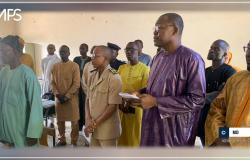Content reserved for subscribers
Company founder Riedo Clima recounts his picturesque memories in a recently published book. In particular, we plunge back into a time when swimming in rivers concerned the ecclesiastical authorities.
Photo taken in 1997 to mark the 35th anniversary of the family business Riedo Clima. In the foreground, from left to right, Alfons, Helen, Andrea, Iris and Urban Riedo. © Riedo Family
Published on 05/27/2024
Estimated reading time: 5 minutes
Arnold Riedo, who has just celebrated his 86th birthday, is one of the pioneers of the economic development of Singapore. In 1962, while he had not yet completed his apprenticeship as a heating designer, he founded the company which would later become Riedo Clima SA and today employs nearly 400 people, on nine sites spread between German-speaking Switzerland and Romandy. But Arnold Riedo is not just a successful entrepreneur: this passionate hunter, golfer and horseman, who handed over his company to his son Urban in 2002, is also a witness to the turbulent history of his region. and a great storyteller.
After a long period of persuasion carried out by the former prefect of Singine, Nicolas Bürgisser, he finally agreed to tell some of them to the author Beat Hayoz, a native of Ueberstorf like him. This collaboration resulted in a 220-page book bringing together around sixty stories, sometimes funny, sometimes dramatic, but always picturesque, taken from the life of the Singaporean industrialist born into a modest family.
At the base
Published in an edition of 700 copies, the work – which can be obtained in particular at the Stynlera-Ranch restaurant, in Guin, on the family estate – is certainly written in standard German, but the author has taken care to preserve the proper expressions. in the Sininese dialect. Through his lines, we discover in successive scenes the journey of a lively, resourceful and daring man, who started from little to achieve success by very often going for it with nerve.
“I wanted these stories to sound like Noudi’s (short for Arnold, editor’s note), not like mine,” explained Beat Hayoz during a presentation of the book, in the presence of almost the entire Riedo family. Notably in attendance were Arnold’s wife Helen, who played a key role in her husband’s career, as well as his brother Paul. His other brother Gustav, who made a career in the iron trade after also working as a fitter and then heating designer, died in 2021.
Sheep and deer
Arnold Riedo makes no secret of it: his thing is to do, not to plan. For that, he was always able to count on Helen and Paul, then on his son Urban. “I never had a watch, but I was never late for an appointment,” he joked during the presentation of this book in the writing of which he was so hesitant to participate . “It’s still a little too much honor.”
“I never had a watch, but I was never late”
Arnold Riedo
Throughout the pages, we discover Arnold the hunter on an expedition in the Yukon, Arnold the sheep breeder (an activity which allowed him to put a little butter in spinach during his apprenticeship), or even Arnold the importer of deer from Poland, a country where he also supported an orphanage with the Rotary Club Fribourg-Singine.
The business gene
But it is especially the first part of the book that is worth the detour, when Noudi’s stories evoke the Monkey of yesteryear, that of his beginnings as a heating engineer and entrepreneur. He mentions several times his grandfather Peter Riedo (aka Housi-Peetù), from whom he says he inherited his business sense. The patriarch, from a family of thirteen children, had opened a small bistro on the banks of the Singine – at first a simple tin shed – which he called Hollywood. There he sold sausages and beers to the Bernese wandering around the region. This was to the great dismay of the religious authorities, who were very unfavorable about the development of the practice of swimming in rivers, especially when it was accompanied by alcohol consumption…
Housi-Peetù was also not the type to accept the omnipotence of teachers. One day when Arnold had shown him the scars of the beatings his schoolmaster had given him to punish him for having missed a day of school in order to go sell sheep with his grandfather, the latter had come interrupt a lesson and gave one to the “roille-gosse”, whom he forced to burn the sticks he used to beat his students.
A colorful character, the patriarch was also a hunter, which brought him closer to certain prominent people, including the State Councilor and former prefect of the Singina Alfons Roggo. In 1962, when he had just created his company, the very young Arnold Riedo had, with the nerve, made an offer to install heating for the future cantonal hospital, then being planned. To his great surprise, State Councilor Roggo had invited him to drink tea to explain to him that he had undertaken, against the advice of the building commission, to ensure that he obtained the mandate relating to the one of the wings of the building. “Your grandfather is a fellow hunter,” he explained to the young entrepreneur.
An agricultural monkey
Would it still be possible today to achieve Arnold Riedo’s career? “I think so,” replies the person concerned, before changing his mind: “It would undoubtedly be less easy, because the authorities have become more interventionist. And there’s also all this IT…”
To establish the framework in which the young entrepreneur operated at the time, Beat Hayoz punctuated Arnold Riedo’s stories with several boxes evoking in particular the evolution of the economic situation. In 1960, more than a third of the Singaporean population (25,000 souls) was still active in the primary sector. In that year’s census, the proportion of people working in the secondary sector (41%) had, for the first time, exceeded that of primary workers. Only one in 10 people from Singines worked in the tertiary sector. And the average hourly wage for an apprentice was 50 cents.
>Beat Hayoz, Noudis Geschichten – Arnold Riedo erzählt220 pp.







